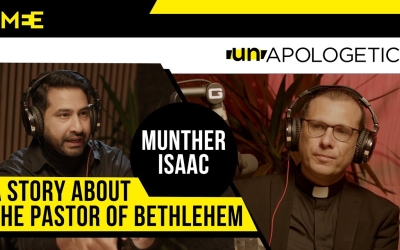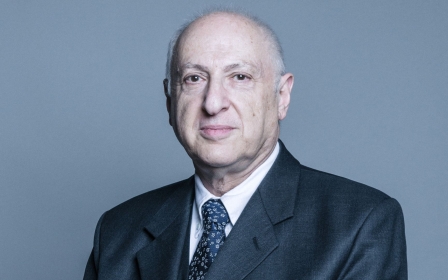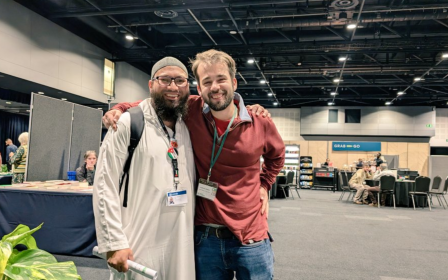Palestinian pastor Munther Isaac 'grateful' for Church of England's call for ceasefire

Palestinian pastor Reverend Munther Isaac has expressed “cautious optimism” that British policy towards Israel could improve under the Labour government, cautioning that the party's actions so far have only been small steps in the right direction.
Isaac, who is a pastor for the Evangelical Lutheran Christmas Church in Bethlehem and the Evangelica Lutheran Church in Beit Sahour, had planned to visit the UK this week as part of a delegation coordinated by UK Christian charity Sabeel-Kairos, the Council for Arab and British Understanding (Caabu) and human rights group FairSquare.
However, the pastor could not leave the occupied West Bank due to the closure of the Allenby Bridge crossing last weekend after a shooting incident.
Instead, Isaac spoke to Middle East Eye from Bethlehem in an interview arranged by Caabu.
The conversation followed last February's public spat between Reverend Isaac and leading members of the Church of England.
New MEE newsletter: Jerusalem Dispatch
Sign up to get the latest insights and analysis on Israel-Palestine, alongside Turkey Unpacked and other MEE newsletters
Justin Welby, the archbishop of Canterbury, had refused to meet Isaac because the Palestinian minister had shared a platform at a protest with Jeremy Corbyn, the former leader of the Labour Party.
Welby later apologised and expressed regret for his decision.
“We have both chosen to move beyond it,” Reverend Isaac told MEE.
Isaac met Welby over Zoom on Monday alongside Palestinian human rights lawyer Dalia Qumsieh and campaigner Mays Nassar.

“It was a very positive meeting,” he said. “The focus was on updates about the latest developments in the West Bank, the fear we have, the restrictions, annexation and violence."
“We discussed specific cases of Palestinian Christian families fighting to keep their land or [being held] in Israeli prison without charge or trial.”
A statement published on the archbishop’s website said that Welby “expressed his deep concern for the thousands of Palestinians, including Christians, currently being held in Israeli military prisons without charge”.
Isaac told MEE that he is grateful the Church of England is being vocal in its call for a ceasefire.
While the church initially failed to do so in October and November last year, he said it was still “among the first in Britain to call for a ceasefire”.
In August, the Anglican leader declared that “the State of Israel has been denying the Palestinian people dignity, freedom and hope", adding that ending the occupation was a "legal and moral necessity".
This marked a significant departure from his stance last year when he denied that Israel was an apartheid state.
That declaration provoked a backlash, with 20 Christian leaders from across Britain issuing a declaration calling Welby’s statement “unbalanced”.
Isaac said: “[The archbishop] was echoing the decision of the International Court of Justice. In England, it is considered controversial to echo the findings of the ICJ. I know the archbishop was criticised from outside the church and inside the church."
“This shows a troubling reality: in a western country that boasts about democracy and human rights, when you echo the findings of the ICJ, it’s considered controversial.”
'A very cautious optimism'
MEE asked Isaac what he thought about the recent changes to British policy since Labour came to power.
In July, the Labour government resumed funding to Unrwa, the UN agency responsible for Palestinian refugees, and dropped its objection to the International Criminal Court’s decision to issue an arrest warrant for Israeli leaders.
'They’re annexing more land. If they do what they’re telling us they will do next, it’s scary'
- Reverend Munther Isaac
Earlier in September, the government suspended 30 out of 350 arms exports to Israel.
“This was a very small step in the right direction,” Isaac said. “It won’t save lives in Gaza or stop the war. A full arms embargo might, as it will put more pressure on the US to do the same."
“It is a very cautious optimism that now we have a change of guard. It signifies that this British government is different than the previous one, which gave a full green light to Israel to do whatever it wants," he added.
“So maybe there is a change. However, for people undergoing a genocide, this seems meaningless until the war ends and those committing war crimes are held accountable.”
Isaac called on ordinary British people to pressure MPs to take more action “and vote responsibly based on their conscience and ethical beliefs.
"It’s not true that what Israel does has nothing to do with them [the British public]. In countries in which leaders are elected, this has everything to do with you."
The pastor further said he was “terrified” of the Israeli government’s escalating military campaign in the occupied West Bank.
“They’re annexing more land. If they do what they’re telling us they will do next, it’s scary. They have given us every reason to take them seriously. They destroyed Gaza and felt no accountability.”
In this situation, Isaac believes the Labour government’s recent actions seem entirely inadequate.
“We have to see results on the ground, not just small steps.”
Middle East Eye delivers independent and unrivalled coverage and analysis of the Middle East, North Africa and beyond. To learn more about republishing this content and the associated fees, please fill out this form. More about MEE can be found here.





